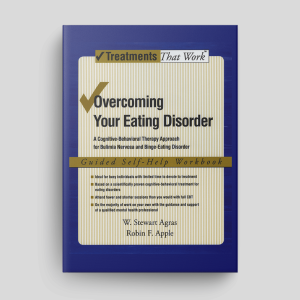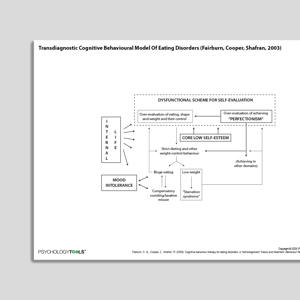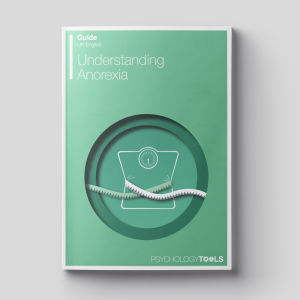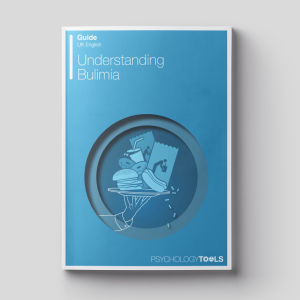Overcoming Eating Disorders (Second Edition): Therapist Guide
The Overcoming Your Eating Disorder therapist guide provides step-by-step instructions and evidence-based strategies for supporting individuals with eating disorders. A client workbook is downloadable separately.
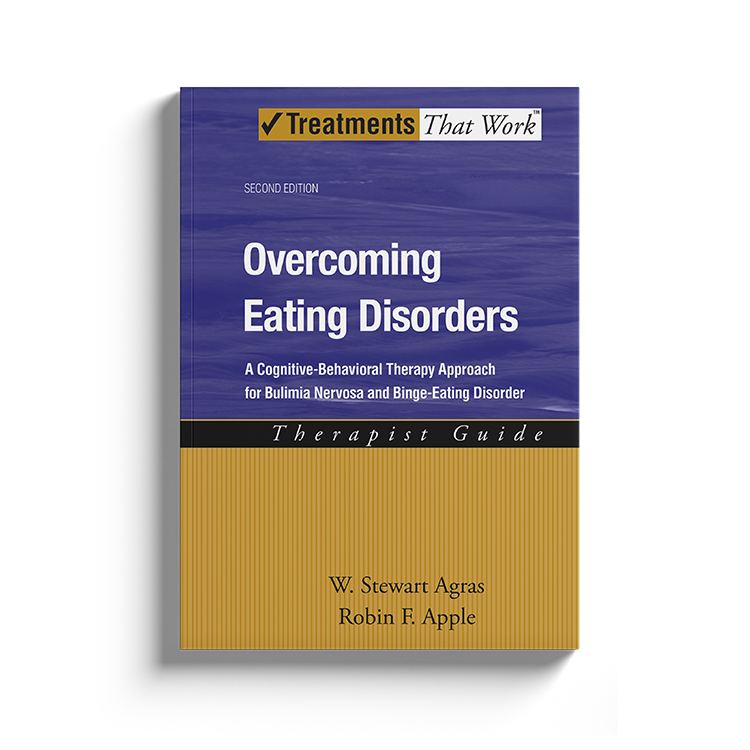
Download or send
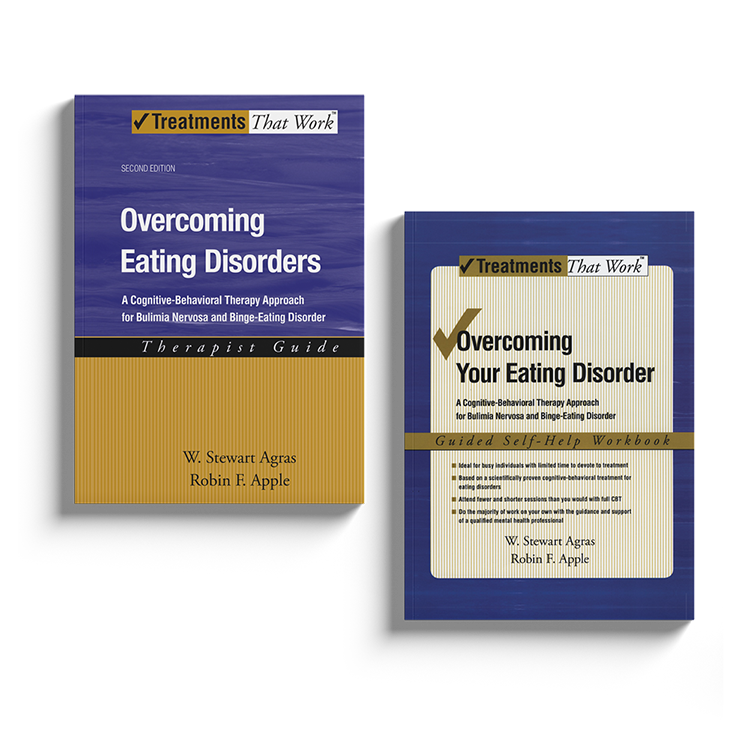
Overview
Cognitive behavioral therapy (CBT) is an effective treatment for eating disorders including bulimia nervosa and binge-eating disorder. It is recommended by the American Psychiatric Association (APA) and the UK National Institute for Health and Care Excellence (NICE). Overcoming Eating Disorders (Second Edition) is written by W. Stewart Agras (Professor Emeritus of Psychiatry at Stanford University School of Medicine) and Robin F. Apple (Clinical Psychologist and previously Associate Clinical Professor at Stanford University), and provides therapists with all the tools they need to deliver effective, evidence-based psychological treatment for bulimia nervosa and binge-eating disorder. Part of the Treatments That Work™ series, it provides step-by-step instructions for teaching clients the skills to improve their eating habits and overcome their food-related difficulties.
Why use this resource?
This program provides a step-by-step, structured approach for treating eating disorders.
- Detailed explanations of cognitive-behavioral principles tailored to eating disorders.
- Evidence-based interventions for overcoming eating disorders.
- Practical guidance for structuring sessions and implementing client exercises.
- Strategies for overcoming common obstacles during treatment.
Key benefits
Structured
Educational
Effective
Trusted
What difficulties is this for?
Bulimia Nervosa (BN)
Characterized by recurring episodes of binge eating followed by compensatory behaviors, such as vomiting.
Binge-Eating Disorder
Recurring episodes of eating large quantities of food, accompanied by a sense of loss of control.
Integrating it into your practice
Assessment
Explore how clients experience their eating disorder.
Psychoeducation
Teach clients about eating disorders and what maintains them.
Skills
Implement effective cognitive-behavioral interventions to address key symptoms.
Monitoring
Use structured worksheets to track progress and refine interventions.
Relapse Prevention
Equip clients with long-term strategies for maintaining their progress.
Theoretical background and therapist guidance
Eating disorders are serious difficulties that can affect anyone. It is estimated that 0.3% and 0.9% of people will experience bulimia nervosa and binge-eating disorder respectively at some point in their lives. Symptoms of include recurrent episodes of binge eating (i.e., eating in a way that feels uncontrolled and distressing), preoccupation with one’s shape and weight, and the use of compensatory behaviors such as self-induced vomiting, laxative use, strenuous exercise, and restriction (note that use of compensatory behaviors applies only to bulimia nervosa).
Overcoming Eating Disorders is a comprehensive program to assist clinicians in delivering effective CBT for bulimia nervosa and binge-eating disorder. The program includes two books:
- Overcoming Eating Disorders: Therapist Guide details the step-by-step cognitive behavioral treatment of bulimia nervosa and binge-eating disorder.
- Overcoming Your Eating Disorder: Workbook is the companion to this therapist guide. It will help your patients to become active participants in their treatment and learn how to establish a regular pattern of eating, address body-image concerns, and tackle intense moods and emotions that affect their eating.
Although written for the client, the exercises in the workbook are intended to be carried out under the supervision of a mental health professional. The authors suggest that the most effective implementation of these exercises requires an understanding of the principles underlying the different procedures, and that mental health professionals should be familiar with both the Overcoming Your Eating Disorder: Workbook and this therapist guide.
Therapists with an active subscription to a Psychology Tools ‘Complete’ plan are licensed to use Treatments That Work® titles, and to download and share chapters with their clients.
Authored by leading psychologists including David Barlow, Michelle Craske and Edna Foa, Treatments That Work™ is a series of manuals and workbooks based on the principles of cognitive behavioral therapy (CBT). Each pair of books - therapist guide and client workbook - contains step by step procedures for delivering evidence-based psychological interventions and will help you to provide the best possible care for your clients.
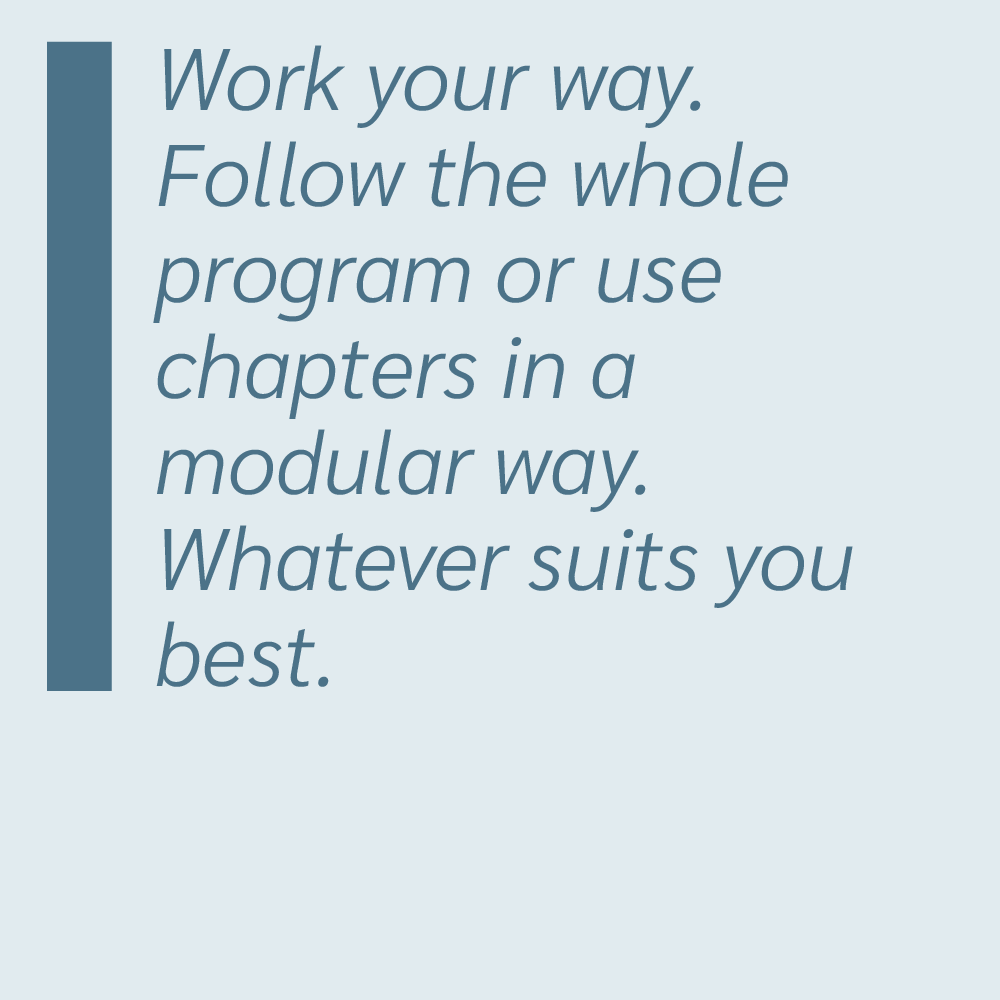
What's inside
- A structured, session-by-session treatment manual.
- Therapist checklists and progress monitoring tools.
- Detailed guidance for implementing cognitive-behavioral interventions for eating disorders.
- Case examples and troubleshooting tips for common challenges.
FAQs
How this resource helps improve clinical outcomes
By integrating this resource into therapy, therapists are able to:
- Deliver a structured, comprehensive treatment specifically developed for eating disorders.
- Implement effective, evidence-based interventions.
- Help clients maintain long-term gains through relapse prevention strategies.
- Tailor treatment to meet diverse client needs
Clinicians who use this resource also use
References and further reading
- Agras, W. S., Telch, C. F., Arnow, B., Eldredge, K., Wilfley, D. E., Raeburn, S. D., et al. (1994). Weight loss, cognitive-behavioral, and desipramine treatments in binge eating disorder. Behavior Therapy, 25, 209-238.
- Agras, W. S., Walsh, B. T., Fairburn, C. G., Wilson, G. T., & Kraemer, H. C. (2000). A multicenter comparison of cognitive-behavioral therapy and interpersonal psychotherapy for bulimia nervosa. Archives of General Psychiatry, 57, 459-466.
- Fairburn, C. G., Norman, P. A., Welch, S. L., OâConnor, M. E., Doll, H. A., & Peveler, R. C. (1995). A prospective study of outcome in bulimia nervosa and the long-term effects of three psychological treatments. Archives of General Psychiatry, 52(4), 304-312.
- Grilo, C. M., Masheb, R. M., & Wilson, G. T. (2005). Efficacy of cognitive behavioral therapy and fluoxetine for the treatment of binge eating disorder: A randomized double-blind placebo-controlled comparison. Biological Psychiatry, 57, 301-309.
- Barlow, D. H. (2004). Psychological treatments. American Psychologist, 59, 869-878.
Just enter your name and email address, and we'll send you Overcoming Eating Disorders (Second Edition): Therapist Guide (English US) straight to your inbox. You'll also receive occasional product update emails wth evidence-based tools, clinical resources, and the latest psychological research.
Product
Company
Support
- © 2025 Psychology Tools. All rights reserved
- Terms & Conditions
- Privacy Policy
- Cookies Policy
- Disclaimer
Working...
We value your privacy
This site uses strictly necessary cookies to function. We do not use cookies for analytics, marketing, or tracking purposes. By clicking “OK”, you agree to the use of these essential cookies. Read our Cookie Policy
